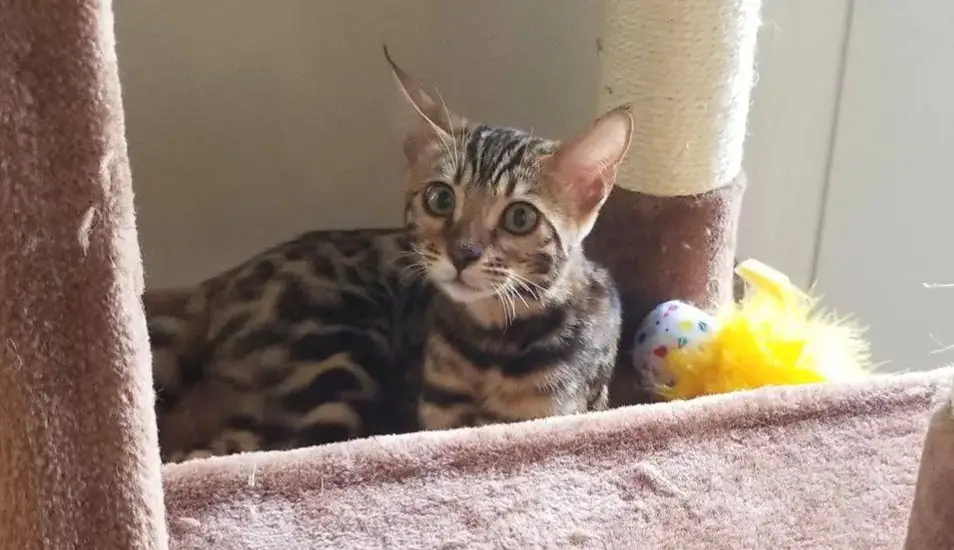Curious about what makes your feline friend wrinkle their cute little nose? We’ve got the inside scoop on the smells that cats absolutely detest.
From citrusy scents to pungent herbs, get ready to discover the aromatic world of smells that will have your whiskered companion running for cover!
Let’s get started!
The Sense of Smell in Cats
One of the most important and amazing senses that cats possess is their sense of smell.
Because of their highly evolved olfactory sense, they are able to identify scents that humans would never be able to.
Cats’ keen sense of smell aids them in navigating their surroundings, locating food, and seeing possible predators or hazards.
The vomeronasal organ, also known as Jacobson’s organ, is a specialized organ in cats that enables them to smell pheromones and learn about other cats and their environment.
Cats’ remarkable sense of smell is essential to their ability to communicate, hunt, and generally survive.
What Smells Do Cats Not Like
There are a lot of smells that cats do not like, the most common ones include; ammonia, onions, garlic, vinegar, pine, peppermint, menthol, thyme, citrus, eucalyptus, and curry.
These smells may be pleasant to us but not to cats, so I suggest you keep them away from cats.
Let’s take it a step further by discussing these smells and why cats do not like them.
In my opinion, here are some of the most common smells cats do not like and why cats don’t like them:
1. Ammonia Smell: Cats have very good senses of smell, and they can be particularly sensitive to ammonia odor.
Since cats are territorial creatures, ammonia is frequently found in urine, and the scent of ammonia can indicate to one of them that another cat has marked its territory.
Keep in mind that your cat may experience stress, anxiety, or even behavioral problems as a result of this.
To keep your cat comfortable and safe, I suggest you exercise caution when using powerful ammonia-based cleansers near them or in locations they frequent.
2. Onions Smell: Cats cannot tolerate certain substances found in onions, such as thiosulphate.
Even the smell of onions may serve as a deterrent for cats.
Because cats don’t have the enzymes to break down these substances, onions can cause hemolytic anemia, a disorder in which the red blood cells degrade.
Keep in mind that weakness and vomiting are among the symptoms that may arise from this, along with more serious health issues.
I strongly suggest that onions and meals seasoned with onions should be kept out of your cat’s reach for their safety.

3. Garlic Smell: Similar to onions, garlic contains ingredients that may be dangerous to cats. Cats may find the scent of garlic offensive, acting as a natural disincentive.
These substances affect cats more than people do, and feeding garlic to cats can cause anemia and other comparable health problems, like onions.
To avoid any health problems, it’s important to be cautious when it comes to garlic in your cat’s surroundings and make sure they aren’t exposed to it in any way.
4. Vinegar Smell: Cats usually find the strong, pungent scent of vinegar unpleasant, even though it’s a favorite natural cleaning.
Their sensitive noses may become irritated and uncomfortable by the vinegar’s acidity.
While vinegar itself is not toxic to cats, the overpowering smell can be overwhelming for them.
It’s best to use vinegar-based cleaners in well-ventilated spaces and to give your cat a secure spot away from the odor.
In this manner, you may keep your cat in a clean environment without bothering it.
5. Pine Smell: The highly developed sense of smell possessed by cats is far more sensitive than that of humans.
Cats may find the overpowering smell of pine, which is frequently present in air fresheners and cleaning supplies, to be overwhelming.
Certain chemicals found in pine oils may irritate or even harm cats. Cats who are exposed to pine scents may show symptoms of discomfort, including coughing, sneezing, or retreating from locations where the scent is prevalent.
Furthermore, a cat’s natural surroundings may be upset by the strong scent of pine, leading to worry and anxiety.
6. Peppermint Smell: People frequently regard peppermint to be a refreshing perfume due to its invigorating and minty aroma. But the menthol in peppermint may be too strong for cats.
Cats have a unique sense of smell that makes them sensitive to a variety of substances, including menthol.
Cats may exhibit behaviors such as avoiding the area, excessive grooming, or even vocalizing their disapproval when they are exposed to peppermint scents.
A cat’s sense of security and comfort in their environment can be disturbed by the potent smell of peppermint.
7. Menthol Smell: A common ingredient in cough drops, topical ointments, and some cleaning products, menthol gives off a cooling sensation that can be uncomfortable for cats.
The strong smell of menthol can irritate a cat’s sensitive nasal passages, causing respiratory distress or avoidance behaviors.
Cats may show signs of stress or discomfort, such as excessive grooming, hiding, or vocalizing when they are exposed to menthol odors.
Therefore, it is important to use caution when using menthol-containing products around cats to avoid any negative reactions.

8. Thyme Smell: Cats typically find the strong scent of thyme, a fragrant herb used in cooking and aromatherapy, unpleasant.
Cats may find the potent aroma of thyme overpowering and avoid places where it is strong.
Sneezing, pawing at their noses, and avoiding contact with items smelling of thyme are some of the characteristics cats may display.
Thyme’s strong scent might interfere with a cat’s ability to perceive scent and comfort, which can cause avoidance behaviors and even worry.
9. Citrus Smell: Owing to their extraordinarily developed sense of smell, cats are particularly sensitive to odors.
Essential oils found in citrus fruits, such as limonene and linalool, are known to be harmful to cats.
If a cat comes into direct touch with these substances, it may have gastrointestinal distress, skin irritation, or even more serious responses.
Cats may find the potent citrus scent overpowering and will avoid areas with strong citrus scents.
Citrus scents cause cats to naturally avoid them as a safety precaution against injury.
10. Eucalyptus Smell: Since eucalyptus oil has a refreshing scent, it is frequently utilized in aromatherapy and home items. Nevertheless, eucalyptus has risks to health and might cause discomfort in cats.
Eucalyptol, a chemical found in eucalyptus, has the potential to be poisonous to cats in significant doses when swallowed or inhaled.
When cats are exposed to strong eucalyptus scents, they may have respiratory problems, nausea, or other negative reactions.
Their natural reaction to protect themselves and preserve their well-being is to be repulsed by the fragrance of eucalyptus.
11. Curry Smell: Cats’ sensitive senses can be overwhelmed by the strong scent of curry spices.
Curry mixes often contain spices like cumin, coriander, and turmeric, which cats may find uncomfortable or irritating to inhale.
Cats use their sense of smell to explore their surroundings, identify possible dangers, and locate food sources.
They might find it difficult to navigate their surroundings due to the strong curry smell comfortably, therefore they might steer clear of places where the smell is very strong.
Why Cats Dislike Certain Smells
Cats have an excellent sense of smell, which is very important to them in their daily life. Interestingly, though, some scents can actually make our feline companions feel uneasy or stressed.
Their evolutionary instincts are the main cause of this aversion. As they are obligate carnivores, cats use their sense of smell to find food and stay clear of any threats.
Cats will therefore typically avoid fragrances that seem to be chemicals that are detrimental to their survival, such as strong chemical aromas or powerful cleaning agent scents.
Their inherent instincts are preserved and their well-being is ensured by their sensitivity to particular smells.
Potential Risks of Exposing Cats to Disliked Smells
There are possible hazards to take into account while exposing cats to unpleasant scents.
Due to their keen sense of smell, cats may become agitated and anxious when exposed to smells they find offensive.
This could result in aggressive conduct or even avoidance of specific places.
To avoid any bad reactions, it’s critical to provide a comfortable environment for your feline companion.
Introducing strange or disagreeable smells can make them feel uneasy and unwell.
To preserve a peaceful living environment for the two of you, always be aware of your cat’s sensitivity to odors.
How to Avoid Disliked Smells in Cat Care
Here are some of my tips for cat owners on minimizing exposure to smells cats dislike:
- Choosing cat-friendly cleaning products
- Avoiding strong fragrances in the home
- Using alternative methods for pest control
- Creating scent-free zones for cats
- Providing natural deterrents for outdoor areas
- Ensuring proper ventilation in the home
Alternatives to Disliked Smells for Cat Enrichment

When adding fragrances to your cat’s surroundings, it’s important to think about substituting unpleasant aromas.
Choose safe herbs that your cat can enjoy sniffing, such as parsley, dill, oregano, and rosemary.
Adding flowering plants and plants that are safe for cats, such as sunflowers, roses, and catnip, can also give your cat a pleasurable sensory experience.
In order to provide your cherished pet with a positive and enriching environment, keep in mind that certain aromas, such as essential oils, hazardous cleaning products, or scented litter, may be off-putting to cats.
You can adjust the enrichment experience to your cat’s tastes by experimenting with different fragrances and watching their reactions.
Conclusion
In summary, cats have a nose for what they dislike. From strong scents like citrus and mint to the pungent odors of vinegar and onions, these are smells cats simply cannot stand. So, if you want to keep your feline friend happy and odor-free, avoid these olfactory offenders at all costs.
Related Questions
Are there any specific scents that cats find repulsive?
Yes, there are several smells that cats dislike, such as citrus, mint, vinegar, and onions. These scents can be overwhelming and unpleasant for our feline friends.
Can I use scented products around my cat?
It’s best to avoid using strongly scented products around your cat, as they can be sensitive to certain odors. Opt for unscented or lightly scented products to ensure your cat’s comfort.
Why do cats react negatively to certain smells?
Cats have a highly developed sense of smell, and certain scents can be overwhelming or even irritating to them. It’s their natural instinct to avoid smells that they find unpleasant.
Are there any natural alternatives to unpleasant scents for cats?
Yes, there are natural alternatives to help deter cats from certain areas. Some options include using citrus peels, fresh herbs like lavender or rosemary, or even certain types of plants that emit smells cats find unappealing, such as rue or coleus.









